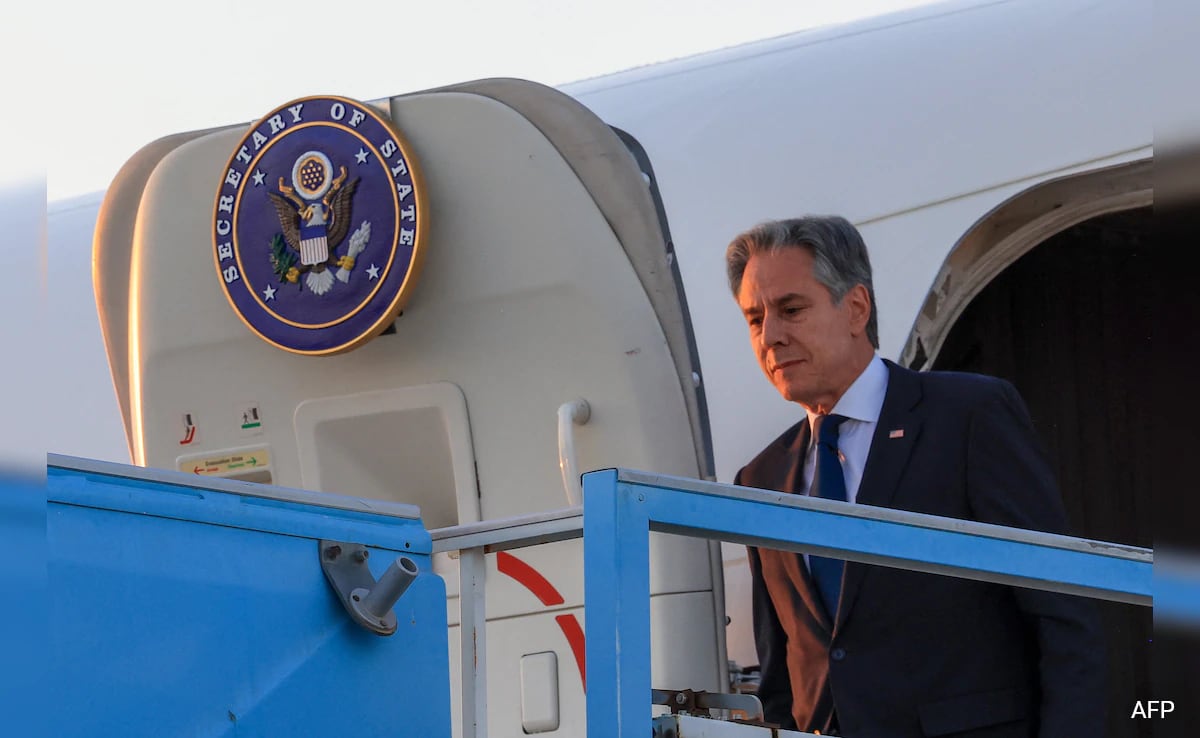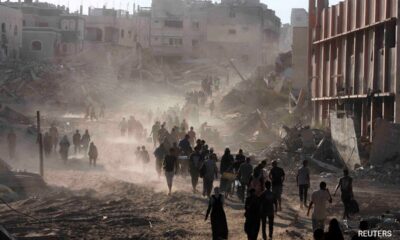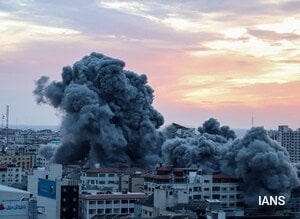Blinken will travel to Cairo later Tuesday
Tel Aviv, Israel:
Israel’s prime minister, who has been under pressure at home and abroad to reach a ceasefire with Hamas, on Sunday accused Hamas operatives of stubbornness in Gaza ceasefire talks as top US diplomat Antony Blinken landed in Israel.
On his ninth trip to the Middle East since the start of the Gaza war when Hamas attacked Israel in October, the US Secretary of State will meet Netanyahu and other Israeli leaders in a renewed effort to broker a deal that would could help prevent a wider fire.
Blinken will travel to Cairo later Tuesday, where ceasefire talks are expected to resume in the coming days.
Prime Minister Benjamin Netanyahu reiterated on Sunday that it is the Palestinian Islamist group Hamas that must be put under pressure.
“Hamas remains stubborn until this moment. It did not even send a representative to the Doha talks. Therefore, the pressure must be focused on Hamas and (Yahya) Sinwar, not on the Israeli government,” Netanyahu said at a meeting. cabinet meeting, referring to the Hamas chief.
Western ally Jordan, hostage supporters protesting in Israel, and Hamas itself have called for pressure on Netanyahu to reach a deal.
Far-right members who are crucial to his governing coalition are against any ceasefire.
Ahead of Blinken’s visit, the foreign ministers of Britain and France were also in Israel on Friday to emphasize the urgency of a Gaza deal.
In late May, US President Joe Biden laid out a framework that he said was proposed by Israel. The UN Security Council later approved the proposal, which would initially freeze fighting for six weeks as Israeli hostages are exchanged for Palestinian prisoners in Israeli prisons and humanitarian aid enters the besieged Gaza Strip.
Ahead of the ceasefire talks in Doha last Thursday and Friday, Hamas called on mediators to implement the Biden framework instead of conducting more negotiations.
Hamas also announced its opposition to what it called “new conditions” from Israel.
On Saturday, Netanyahu’s office said in a statement that Israeli negotiators expressed “cautious optimism” about reaching a ceasefire in Gaza.
U.S., Qatari and Egyptian mediators also reported progress, and a U.S. official said remaining gaps were “bridgeable.”
But after Biden said that “we are closer to a deal than ever before,” Hamas Political Bureau member Sami Abu Zuhri dismissed such optimistic talk as “an illusion.”
Earlier announcements that a deal was close during months of ceasefire negotiations proved unfounded.
But the stakes have risen since the late July assassinations in quick succession of Iran-backed militant leaders, including Hamas political leader Ismail Haniyeh, and as the humanitarian crisis in Gaza worsened amid a feared polio outbreak.
Israeli evacuation orders have reduced “the safe zone” in the south of the area, leaving “no room” for displaced Palestinians, says Samah Dib, 32.
Some people are “sleeping on the streets” while clean water is scarce and “there is food in the markets, but it is very expensive and we have run out of money,” said Dib, who like almost all Gaza residents is among the displaced .
As efforts to broker a long-sought ceasefire continued, so did violence in Gaza, as well as in the Israeli-occupied West Bank and Lebanon, where Israeli forces and Iran-backed Hamas ally Hezbollah , exchanged fire almost daily during the war. They did that again on Sunday.
The rumbling of tanks
Civil defense rescuers in Hamas-run Gaza reported that seven people were killed in the Israeli bombardment of Deir el-Balah and four others in airstrikes on the northern Jabalia refugee camp.
The latest killings have helped push the Health Ministry’s war death toll in Gaza to 40,099.
Hamas’ attack on Israel on October 7, which started the war, resulted in the deaths of 1,198 people, mostly civilians, according to an AFP tally of Israeli official figures.
The Israeli military said troops continued operations in central and southern Gaza and “eliminated” officers in Rafah, on the territory’s border with Egypt.
From Israel’s designated safe zone in Al-Mawasi in southern Gaza, Lina Saleha, 44, said she could hear “constant artillery shelling” and the rumbling of tanks “getting closer.”
“That’s not a good sign and we’re terrified and scared,” she said.
In the West Bank, Israel said late Saturday that it had killed “two senior Hamas officials” in Jenin. Hamas’ armed wing confirmed the deaths of two militants.
In Lebanon, the UN said three peacekeepers were slightly injured in an explosion in the south of the country.
Calls for ‘pressure’
Iran and its regional allies have vowed retaliation for Haniyeh’s death in Tehran – for which Israel has not claimed responsibility – and for an Israeli attack in Beirut that killed a top Hezbollah commander.
In Israel, Blinken will try to “conclude the agreement for a ceasefire and the release of hostages and prisoners,” the State Department said.
Of the 251 hostages seized in the Hamas attack, 111 are still being held in Gaza, with 39 of them dead, according to the military. More than a hundred people were released during a week-long ceasefire in November.
The Palestinian Prisoners Club watchdog said Israeli forces have detained “more than 10,000 Palestinians” in the West Bank since the start of the Gaza war and have annexed East Jerusalem, which Israel seized in 1967.
At a rally in the Israeli city of Haifa on Saturday, Guri Lotto, 51, said he was protesting to “put pressure on the government” to secure a deal to release hostages and end the war.
A U.S. official traveling with Blinken said on condition of anonymity that “the feeling is… that several bottlenecks that existed before are bridgeable, and the work will continue.”
(Except for the headline, this story has not been edited by NDTV staff and is published from a syndicated feed.)














